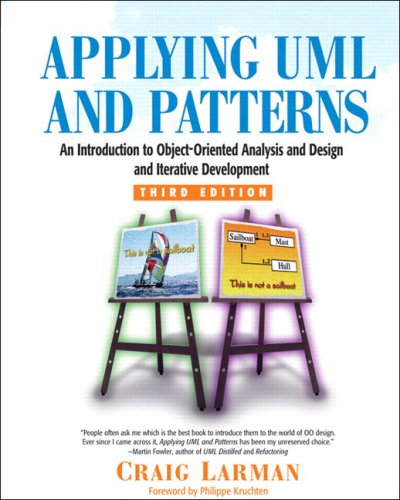
Applying UML and Patterns: An Introduction to Object-Oriented Analysis and Design
by Craig Larman
Publisher: Prentice Hall 2004
ISBN/ASIN: 0131489062
Number of pages: 616
Description:
This book is a lucid and practical introduction to thinking and designing with objects—and creating systems that are well crafted, robust, and maintainable. Developers and students will learn object-oriented analysis and design (OOA/D) through three iterations of two cohesive, start-to-finish case studies. These case studies incrementally introduce key skills, essential OO principles and patterns, UML notation, and best practices.
Download or read it online for free here:
Download link
(15MB, PDF)
Similar books
 Object-Oriented System Development
Object-Oriented System Developmentby Dennis deChampeaux, Doug Lea, Penelope Faure - Addison-Wesley
With this book, software engineers, project managers, and tool builders will better understand the role of analysis and design in the object-oriented (OO) software development process. The emphasis is on development principles and implementation.
(20484 views)
 Working With Objects
Working With Objectsby T. Reenskaug, P. Wold, O.A. Lehne - Prentice Hall
The main theme of this book is to describe complex phenomena as structures of interacting objects. This is the authoritative account of the OOram methodology for software analysis, design, development, maintenance, and reuse.
(16344 views)
 Object-Oriented Programming with ANSI-C
Object-Oriented Programming with ANSI-Cby Axel-Tobias Schreiner
In this book, we are going to use ANSI-C to discover how object-oriented programming is done, what its techniques are, why they help us solve bigger problems, and how we harness generality and program to catch mistakes earlier.
(18918 views)
 Principles of Object-Oriented Programming
Principles of Object-Oriented Programmingby Dung Nguyen, Stephen Wong - Rice University
From the table of contents: Introduction - Objects and Classes; Polymorphism in Action; Immutable List Structure; Mutable Data Structures; Restricted Access Containers; GUI Programming; Labs; Resources - Java Syntax Primer.
(7943 views)